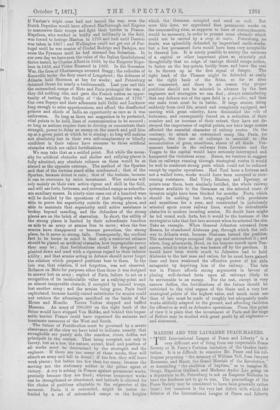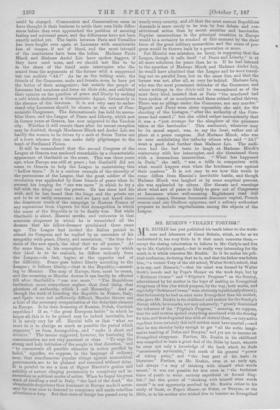MAZZINI AND THE LAUSANNE PEACE-MAKERS.
"THE International League of Peace and Liberty" is a very different sort of thing from our respectable Peace Society or M. Passy's Parisian imitation of the Quaker insti- tution, It is as difficult to conceive Mr. Pease and his col- leagues proposing "the memory of William Tell, Jean Jacques Rousseau, and Marat, the Grand Messiah of the Revolution," or demanding "the abolition of baptism," as to imagine M. Goegz, Napoleon Gaillard, and Madame Andre Leo going on a deputation to St. Petersburg to ask an Emperor Nicholas to have the kindness not to go to war. The proceedings of the Peace Society may be considered to have been generally rather tame ; but tameness is the very last dofect with which the debates of the International League of Peace and. Liberty could be charged. Communists and Conservatives seem to have thought it their business to settle their own little differ- ences before they even approached the problem of securing lasting and universal peace, and the differences have not been exactly settled yet. The battle between Paris and Versailles has been fought over again at Lausanne with considerable loss of temper, if not of blood, and the most intrepid of the combatants have been the ladies. Madame Paula litinck and Madame Ancir6 Leo have spoken daggers, if they have used none, and we should not like to be in the shoes of the timid male interrupter who dis- sented from the arguments of the former with a suppressed but too audible " Ah l" As far as the talking went, the friends of the Commune, male and female, seem to have got the better of their antagonists ; but outside the people of Lausanne had numbers and force on their side, and exhibited their opinion on the question of peace and liberty by sacking a cafe which sheltered a Communistic Agape, fortunately in the absence of the devotees. It is not very easy to under- stand why Lausanne should be chosen as the seat of Com- munistic Congresses. The Internationale has held its assem- blies there, and the League of Peace and Liberty, which met in former years at Geneva, has now migrated to the Vaudois city. Whether it will remain there after its recent reception may be doubted, though Mesdames Minck and Andra Leo are hardly the women to be driven by a mob of Swiss Tories out of a town whence they can make daily pilgrimages to the tomb of Ferdinand Flown.
It will be remembered that the second Congress of the League at Geneva was rendered remarkable by a characteristic appearance of Garibaldi on the scene. This was three years ago, when Europe was still at peace ; but Garibaldi did not come to Geneva to help the League in maintaining this " hollow truce." It is a curious example of the sincerity of the pretensions of the League, that the great soldier of the revolution was applauded by these friends of peace when he avowed his longing for "one war more" in which to try a fall with the kings and the priests. He has since had his wish, and he has found that the kings and the priests are not to be so easily overcome ; and we have not heard since the disastrous result of the campaign in Eastern Franco of any aspirations from Caprera for that Armageddon in which the cause of the Republic is to be finally won. But while Garibaldi is silent, Mazzini speaks, -and reiterates in that sonorous eloquence in which he is unmatched all the dreams that his fellow-dreamer proclaimed three years ago. The League had invited the Italian patriot to attend its Congress, and he replied by an assurance of his sympathy with peace, liberty, and association, "the true for- mula of the new epoch, the ideal that we all pursue." At the same time, in his conception of the means by which this ideal is to be realized, he differs radically from the League,—in fact, begins at the opposite end of the difficulty. Peace goes before liberty according to the League ; it follows liberty,—that is the Republic,—accord- ing to Mazzini. The map of Europe, then, must be recast, and the recasting as Mazzini desires it can hardly be effected till after Garibaldi's " one war more." "The Republican institution must everywhere replace that dead thing, that phantom of authority, which I call Monarchy." And as though the work of founding the Republic in France, Italy, and Spain were not sufficiently difficult, Mazzini throws out a hint of the necessary reorganization of the Sclavonic element in Europe. Is he then dreaming of Russian, Polish, Czechish republics I If so, "the great European battle "in which he hopes all this is to be gained may be indeed inevitable, but it is surely very far off. Mazzini tells us that " what we must do is to abridge as much as possible the period which separates" us from Armageddon, and "make it short and decisive." The means suggested, however, for hastening the consummation are not very practical or dear. "To urge the strong and holy initiation of the people in that direction," and "to concentrate all possible elements in action purified by belief," signifies, we suppose, in the language of ordinary men, that simultaneous popular risings against monarchical governments are to be planned and executed without delay. It is painful to see a man of Signor Mazzini's genius and nobility of nature clinging persistently to conspiracy and in- surrection as political modes of action. When he began his great work of kindling a soul in Italy, "the land of the dead," the abominable despotisms then dominant in Europe made it neces- sary for true men to descend to conspiracy and made rebellion nearly every country, and all that the most earnest Republican demands is more surely to be won by free debate and con- stitutional action than by secret societies and barricades. Popular insurrections in the principal countries in Europe would to a certainty be crushed at this moment by the sheer force of the great military monarchies, and the cause of pro- gress would be thrown back by a generation or more. But Mazzini was mistaken, we fancy, in supposing that the League, though it calls itself "of Peace and Liberty," is at all more solicitous for peace than he is. If he had listened to the speeches of Madame Minck and Madame Andre Leo, he would have admitted that the League and he were travel- ling not on parallel lines, but on the same line, and that the former was not, after all, BO very far behind. Madame Leo, who was the most prominent defender of the Commune, and whose writings in the Sige/e will be remembered as of the most fiery kind, insisted that at Paris "the murdered had been spoken of as murderers and those robbed called thieves. There was no pillage under the Commune, nor any murder." Rigault and Ferry were alone reponsible, oho said, for the shooting of the hostages, "after the authority of the Com- mune had ceased ;" but she added rather inconsistently that it was a "just revenge for the slaughter of the prisoners taken at the barricades." This sentiment, whatever may be its moral aspect, was, to say the least, rather out of place at a peace congress. But Madame Minch, who was so near annihilating the unlucky citizen who said "Ali 1" went a good deal further than Madame Leo. The audi- ence had the bad taste to laugh at Madame Minck's controversy with her interrupter, and she threatened them with a tremendous insurrection. "What has happened in Paris," she said, " was a trifle in comparison with what would happen soon when the bondsmen TM against their masters." It is not easy to see how this wrath to COMO differs from Mazzini's inevitable battle, and though Madame Minch was laughed at by some sceptical persons, she was applauded by others. Iler threats and warnings show what sort of peace is likely to grow out of Congresses at Lausanne where well-meaning Englishmen read. dull economic essays, German democrats denounce capital, French women read out libellous epigrams, and a solitary enthusiast proposes to include vegetarianism among the objects of the League.



































 Previous page
Previous page